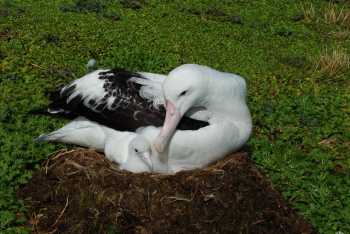Samantha Patrick and Henri Weimerskirch (Centre d'Etudes Biologiques de Chizé, Villiers-en-Bois, France) have published in the Proceedings of the Royal Society B on the effects of personality on breeding in Wandering Albatrosses Diomedea exulans.
The paper’s abstract follows:
“Studies are increasingly demonstrating that individuals differ in their rate of ageing, and this is postulated to emerge from a trade-off between current and future reproduction. Recent theory predicts a correlation between individual personality and life-history strategy, and from this comes the prediction that personality may predict the intensity of senescence. Here we show that boldness correlates with reproductive success and foraging behaviour in wandering albatrosses, with strong sex-specific differences. Shy males show a strong decline in reproductive performance with age, and bold females have lower reproductive success in later adulthood. In both sexes, bolder birds have longer foraging trips and gain more mass per trip as they get older. However, the benefit of this behaviour appears to differ between the sexes, such that it is only matched by high reproductive success in males. Together our results suggest that personality linked foraging adaptations with age are strongly sex-specific in their fitness benefits and that the impact of boldness on senescence is linked to ecological parameters.”
Click here for a related paper by the same authors and also here for a popular article on their work..

Wandering Albatross: bold or shy? Photograph by Genevieve Jones
Reference:
Patrick, S.C & Weimerskirch, H. 2015, Senescence rates and late adulthood reproductive success are strongly influenced by personality in a long-lived seabird. Proceedings of the Royal Society B 292. 2014 doi:10.1098/rspb.2014.1649.
John Cooper, ACAP Information Officer, 28 December 2014

 English
English  Français
Français  Español
Español